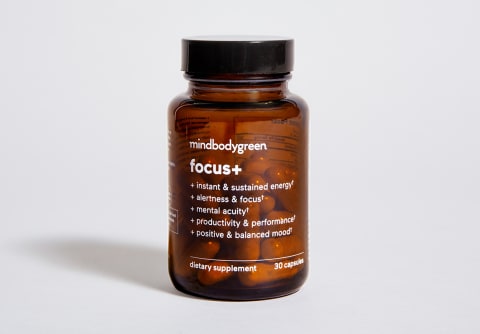Advertisement
How L-Theanine & Caffeine Have Helped Buddhist Monks & Neurohackers Alike


Ashley Jordan Ferira, Ph.D., RDN is Vice President of Scientific Affairs at mindbodygreen. She received her bachelor's degree in Biological Basis of Behavior from the University of Pennsylvania and Ph.D. in Foods and Nutrition from the University of Georgia.
In the coffee vs. matcha debate, I'm team matcha all the way. Ever since matcha lattes have become my morning drink of choice, I've noticed improvements in my mood, ability to focus, and overall mental well-being.
Thanks to a number of scientific studies and reviews, I now know that these health benefits are due to the unique pairing of two synergistic compounds: L-theanine and caffeine. And no surprise here, Buddhist monks discovered and harnessed matcha's powerful cognitive effects long before I ever did.
What are caffeine and L-theanine?
A famous phytonutrient found in coffee and tea, caffeine doesn’t need much of an introduction. Lauded by entrepreneurs, tired parents, and college students alike, this energizing compound helps wake folks up in the morning, fuel productive workdays, and gather friends to socialize.
L-theanine is a less-known (but very up-and-coming) bioactive amino acid that’s especially concentrated in green tea.
Both caffeine and L-theanine naturally have nootropic properties, which means they impart unique mechanisms and actions in the brain. Whether you’re utilizing their cognitive benefits in your morning beverage or a supplement, L-theanine and caffeine are ideal tools for mood support, enhancing alertness, and more.*
The history of L-theanine and caffeine, from tea ceremonies to nootropic supplements.
Green tea was first brought to China during the eighth century by monks that traveled there to study Buddhism. "Green tea became associated with meditation because of the relaxation effect of the L-theanine in green tea," explains Michael Lelah, Ph.D., chief science officer at NutriScience®. "At the time, the monks found that green tea helped them concentrate and remain alert during their many hours of meditation."
Most modern matcha powders originate from Japan, but a few centuries passed before matcha tea (which contains a good amount of L-theanine1, ranging from about 6 to 45 milligrams) was first introduced to Japan by Buddhist monks in the 13th century. Lelah explains that it was in Japan that matcha gained its rich cultural history: "Over the subsequent centuries, green tea was not only linked to meditation—ceremonies were also developed for the preparation, serving, and consumption of green tea. This extended the relaxation effect into a social process of drinking," he says.
Traditional tea ceremonies are still performed in Japan, but matcha is also enjoyed more casually throughout Asia and the Western world. Still, many use matcha to achieve a mental state that's calm and relaxed, yet focused—just as Buddhist monks did—to supplement their meditation practice, power through their to-do list, or simply uplift their spirits as they mosey through their day.
Thanks to modern research, we now have the scientific evidence to support these desired health benefits and confirm the potent power of caffeine and L-theanine that's been utilized for centuries.
After studies revealing the synergistic benefits of L-theanine and caffeine began to surface, it wasn’t long before their nootropic actions found their way into innovative supplement formulas and neurohackers' daily ritual. Today, you can find focus and concentration supplements that contain either one or both of these compounds.
Here are some ways that L-theanine and caffeine have been found to promote cognitive function and mental well-being.*
The benefits of L-theanine & caffeine together.
According to a scientific review, L-theanine affects brain wave production2—specifically, the levels of alpha and beta brain waves—to help sustain focus over long periods of time rather than shorter spurts.*
"L-theanine crosses the blood-brain barrier and acts directly on the brain to increase alpha waves to create a state of 'wakeful relaxation,'"* Lelah explains, adding that this effect can be felt 30 to 60 minutes after consuming L-theanine.
A 2008 study from the Asia Pacific Journal of Clinical Nutrition found similar results, stating that L-theanine had a significant impact on mental alertness and arousal, thanks to its influence on alpha-wave production and the central nervous system as a whole.*
Speaking of mental alertness, caffeine has been found to increase attention and focus as well: According to a 2016 study from The Journal of Psychopharmacology, supplementing with caffeine significantly improved sustained attention3 in healthy adults.*
Participants also reported increased feelings of alertness, contentment, and overall mood.* So, no—you’re not alone if you feel happier and prepared to face the day after your morning cup of coffee!
When caffeine and L-theanine are paired together, their beneficial effects work synergistically to increase focus, energy, attention, and overall cognitive function.* In a 2010 Nutritional Neuroscience study, participants given L-theanine and caffeine were more alert and better able to focus their attention on cognitively demanding tasks than the placebo group.*
Additionally, L-theanine seems to "cancel out" some of the less desirable side effects of caffeine use. A 2015 study from Psychopharmacology showed that L-theanine works synergistically to counteract the vasoconstrictive effects of caffeine4 and promote healthy cerebral blood flow.* (Translation: More blood flow to the brain means more oxygen and nutrients that support cognitive function!)
FAQ
What are the side effects of L-theanine?
L-theanine is not known to elicit negative effects and is a very safe amino acid. Its history of use in tea goes back thousands of years, further bolstering this phytonutrient's welfare and safety.
To inform current clinical research, early preclinical dose-response studies in animals helped establish safety limits for intake. In animal research (rodents), L-theanine has been demonstrated to be safe even at very high doses (the highest dose tested was 4,000 milligrams per kilogram of body weight per day).
And for the much lower, yet effective L-theanine doses found in supplements, there’s research to back up the compound’s high tolerance and safety as well. For example, in this 2019 randomized controlled trial, healthy adults took 200 milligrams of L-theanine daily for four weeks, and zero adverse effects were reported.
That said, everyone's response to foods, beverages, and supplements are different and depend on individualized factors, so it’s always a good idea to talk to your health care provider first before adding L-theanine to your health regimen.
Should I take L-theanine in the morning or at night?
It depends on your desired results! While L-theanine has been found to both promote focus mental alertness during the day, at higher doses (200 milligrams), its effect on alpha brain wave activity can also help enhance sleep quality at night.*
If you decide to utilize L-theanine before bedtime to support deep, restful sleep, make sure to choose a tea or supplement without caffeine. Caffeine-containing supplements featuring L-theanine are designed to be utilized in the morning to midday for mind and body energy, as well as focus.*
The takeaway.
If you're looking for mood-lifting, energizing cognitive support throughout your day, L-theanine and caffeine just might be your new best friends.* To harness the cognitive benefits of this dynamic duo the way monks did, try swapping your morning coffee for a matcha latte.
If that umami flavor isn't your style (or even if it totally is), you can also leverage the benefits of a high-quality nootropic supplement like mindbodygreen's focus+, which contains both instant- and sustained-release caffeine (from organic whole coffee fruit and green coffee beans, respectively), pure L-theanine in its most researched form (Suntheanine®), and other brain-supporting bioactives (like Panax ginseng, guarana, and vitamin B12).*
Watch Next
Enjoy some of our favorite clips from classes
Enjoy some of our favorite clips from classes
What Is Meditation?
Mindfulness/Spirituality | Light Watkins
Box Breathing
Mindfulness/Spirituality | Gwen Dittmar
What Breathwork Can Address
Mindfulness/Spirituality | Gwen Dittmar
The 8 Limbs of Yoga - What is Asana?
Yoga | Caley Alyssa
Two Standing Postures to Open Up Tight Hips
Yoga | Caley Alyssa
How Plants Can Optimize Athletic Performance
Nutrition | Rich Roll
What to Eat Before a Workout
Nutrition | Rich Roll
How Ayurveda Helps Us Navigate Modern Life
Nutrition | Sahara Rose
Messages About Love & Relationships
Love & Relationships | Esther Perel
Love Languages
Love & Relationships | Esther Perel












